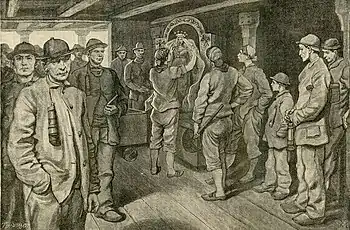Henri Théophile Hildibrand
Henri Théophile Hildibrand (19 June 1824, Paris - 13 August 1897, Pacy-sur-Eure)[1] was a French wood-engraver; primarily for the firms of Hetzel and Hachette.
%22_(19750256739).jpg.webp)

Life and work
He studied engraving at the "Atelier ABL",[2] founded in 1832 by Jean Best (1808–1879), Isidore Leloir (born c.1803) and the British wood-engraver, John Andrew, to create vignettes for Le Magasin pittoresque.
In the early part of his career, he was an associate of François Pannemaker. At that time, he became one of the best known translators of the works of Gustave Doré and a master of colored engraving.
In 1845, he was one of a group of engravers that composed over 200 illustrations for "Mysteries of the Inquisition, and other secret societies of Spain" by "Victor De Féréal" (a pseudonym). Published by Boizard, it became a great success and a bit of a scandal.
He also worked with the publishing firm of Hetzel; notably on illustrations for the novels of Jules Verne. Together with Charles Laplante, Charles Barbant and, for a time, Fortuné Méaulle, he worked with Hachette on their Bibliothèque rose series for young readers.
Some of his works also appeared in periodicals, such as Le Tour du monde, where many of his wood-engravings were based on photographs (via drawings); notably those of Émile Gsell.
References
Further reading
External links
![]() Media related to Henri Theophile Hildibrand at Wikimedia Commons
Media related to Henri Theophile Hildibrand at Wikimedia Commons